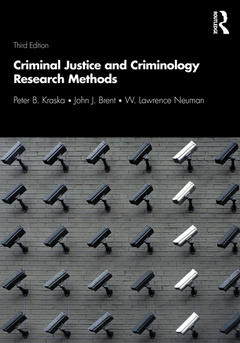Description
Criminal Justice and Criminology Research Methods (3rd Ed.)
Authors: Kraska Peter, Brent John, Neuman W. Lawrence
Language: English
Subject for Criminal Justice and Criminology Research Methods:
Keywords
Quantitative Research; Justice Researchers; Criminal justice research methods; Swat; Criminology research methods; Vice Versa; Thomas Kuhn; Ethnographic Field Research; research ethics; Justice Studies; design and measurement; Swat Team; sampling; Nonreactive Methods; experimental and quasi-experimental research; Nonreactive Research; prison medical research; Historical Comparative Research; Lonnie Athens; Justice Phenomena; deductive and inductive theorizing; Mixed Methods Research; Durkheim’s intervening variable; Justice Research; survey and interview methods; Random Assignment; data analysis; Social Science Research; quantitative data; Capital Punishment; qualitative and quantitative research; Cambridge Somerville Youth Study; ethnographic research; Survey Research Interview; mixed methods; Roadside Memorial; writing and presenting research; Young Man; Crime scene forensics; Literature Review; Criminology research; Simple Random; Juvenile justice; Base Jumper; Community-oriented policing; NVAW Survey; Criminal justice; ESA
Approximative price 93.24 €
In Print (Delivery period: 14 days).
Add to cartPublication date: 12-2020
· 17.8x25.4 cm · Paperback
262.97 €
In Print (Delivery period: 14 days).
Add to cartPublication date: 12-2020
· 17.8x25.4 cm · Hardback
Description
/li>Contents
/li>Readership
/li>Biography
/li>
Criminal Justice and Criminology Research Methods, Third Edition, is an accessible and engaging text that offers balanced coverage of a full range of contemporary research methods.
Filled with gritty criminal justice and criminology examples including policing, corrections, evaluation research, forensics, feminist studies, juvenile justice, crime theory, and criminal justice theory, this new edition demonstrates how research is relevant to the field and what tools are needed to actually conduct that research. Kraska, Brent, and Neuman write in a pedagogically friendly style yet without sacrificing rigor, offering balanced coverage of qualitative, quantitative, and mixed methods. With its exploration of the thinking behind science and its cutting-edge content, the text goes beyond the nuts and bolts to teach students how to competently critique as well as create research-based knowledge.
This book is suitable for undergraduate and early graduate students in US and global Criminology, Criminal Justice, and Justice Studies programs, as well as for senior scholars concerned with incorporating the latest mixed-methods approaches into their research.
Part 1: Disciplinary, Theoretical, and Philosophical Foundations; 1. Criminal Justice And Criminology Research: Mapping the Terrain; 2. The Nature of Science and Research; 3. Philosophical and Theoretical Foundations; Part 2: Considerations in Research Preparation; 4. The Ethics of Crime and Justice Research; 5. Research Design and Measurement; 6. Sampling in Crime and Justice Research; Part Three: Quantitative Data Collection and Analysis; 7. Experimental and Quasi-Experimental Crime and Justice Research; 8. Survey and Interview Methods; 9. Nonreactive Research: Content and Secondary Data Analysis; 10. Analysis of Quantitative Data; Part Four: Qualitative and Mixed Methods Research; 11. Qualitative Research and Analysis; 12. Ethnographic Field Research and Qualitative Interview; 13. Content Analysis, Historical Research, and Mixed Methods; 14. Writing and Presenting Research
Pete Kraska, Ph.D. is a professor in the School of Justice Studies. He has distinguished himself as a leading scholar in the areas of police and criminal justice militarization, criminal justice theory, and mixed-methods research. He has published seven books including Criminal Justice and Criminology Research Methods, Theorizing Criminal Justice: Eight Essential Orientations, and MilitarizingThe American Criminal Justice System: The Changing Roles of the Armed Forces and Police. Dr. Kraska’s research has also been published in a number of leading journals, including the British Journal of Criminology, Social Problems, Justice Quarterly, and Policing and Society. Dr. Kraska’s work has received national and international recognition. He is frequently asked to present his research and findings to academic and policy audiences, including most recently testifying for the US Senate on police militarization. His work has also been featured in media outlets such as 60 Minutes, The Economist, Washington Post, BBC, New York Times, Wall Street Journal, Huffington Post, National Public Radio, and PBS News Hour.
John J. Brent, Ph.D. is an Assistant Professor in the School of Justice Studies at Eastern Kentucky University. He holds a Ph.D in Criminology from the University Delaware. His interests focus on: the cultural and structural dynamics of crime and crime-control; how institutions create and perpetuate inequalities; building a theoretical foundation for criminal justice theory; and how individuals are disciplined and punished.
W. Lawrence Neuman, Ph.D. is a Professor Emeritus of Sociology at the University of Wisconsin, Whitewater. He has authored a number of methodological textbooks and published articles in leading academic journals covering a host of so

